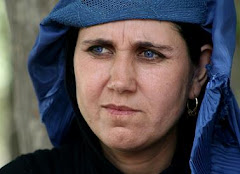Human rights, including women’s rights, must not be traded away or compromised during any reconciliation talks with the Taleban in Afghanistan, Amnesty International said on the eve of a London conference set to discuss deteriorating security conditions in the country.
Afghan President Hamid Karzai, UN Secretary General Ban Ki-Moon, other leaders and foreign ministers are to discuss security arrangements in Afghanistan for the next two years, including reconciliation programmes to reintegrate so-called moderate elements of Taleban.
"Any discussions with the Taleban must include clear commitments that they will respect and promote the rights of the Afghan people," said Sam Zarifi, Amnesty International's Asia-Pacific director.
“The Taleban established a terrible record of violating human rights during their rule and they have done nothing since then to indicate they will act differently if they return to power.”
"The policymakers gathered in London this week have to show that they will not sacrifice the well-being of the Afghan people at the altar of political and military expediency."
Similar deals with the Taleban in neighbouring Pakistan led to increased human rights violations in areas under Taleban control and a significant escalation in conflict and insecurity.
The Afghan government and insurgent groups must both adhere to Afghanistan’s obligations under international human rights law and domestic law, Amnesty International said.
The Taleban and other insurgent groups in Afghanistan have shown little regard for human rights and the laws of war, deliberately targeting civilians, launching indiscriminate suicide attacks in which civilians are killed and engaging in the wholesale destruction of girls’ education.
According to UN figures, the Taleban were responsible for two thirds of the more than 2400 civilian casualties in Afghanistan last year, the bloodiest year yet since the fall of the Taleban.
In areas under their control, the Taleban have severely curtailed the rights of girls and women, including the denial of education, employment, freedom of movement and political participation and representation.
Afghan civil society groups, in particular women's groups, have voiced serious alarms about the prospect of ceding any type of political control to the Taleban.
“Diplomatic efforts to resolve the conflict are a positive step forward,” said Sam Zarifi, “but the rights of the Afghan people must never be negotiated away.
“It is our experience that peace without justice or human rights is not real peace and could ultimately lead to further conflict.”
Afghan President Hamid Karzai, UN Secretary General Ban Ki-Moon, other leaders and foreign ministers are to discuss security arrangements in Afghanistan for the next two years, including reconciliation programmes to reintegrate so-called moderate elements of Taleban.
"Any discussions with the Taleban must include clear commitments that they will respect and promote the rights of the Afghan people," said Sam Zarifi, Amnesty International's Asia-Pacific director.
“The Taleban established a terrible record of violating human rights during their rule and they have done nothing since then to indicate they will act differently if they return to power.”

"The policymakers gathered in London this week have to show that they will not sacrifice the well-being of the Afghan people at the altar of political and military expediency."
Similar deals with the Taleban in neighbouring Pakistan led to increased human rights violations in areas under Taleban control and a significant escalation in conflict and insecurity.
The Afghan government and insurgent groups must both adhere to Afghanistan’s obligations under international human rights law and domestic law, Amnesty International said.
The Taleban and other insurgent groups in Afghanistan have shown little regard for human rights and the laws of war, deliberately targeting civilians, launching indiscriminate suicide attacks in which civilians are killed and engaging in the wholesale destruction of girls’ education.
According to UN figures, the Taleban were responsible for two thirds of the more than 2400 civilian casualties in Afghanistan last year, the bloodiest year yet since the fall of the Taleban.
In areas under their control, the Taleban have severely curtailed the rights of girls and women, including the denial of education, employment, freedom of movement and political participation and representation.
Afghan civil society groups, in particular women's groups, have voiced serious alarms about the prospect of ceding any type of political control to the Taleban.
“Diplomatic efforts to resolve the conflict are a positive step forward,” said Sam Zarifi, “but the rights of the Afghan people must never be negotiated away.
“It is our experience that peace without justice or human rights is not real peace and could ultimately lead to further conflict.”
.jpg)


.jpg)



